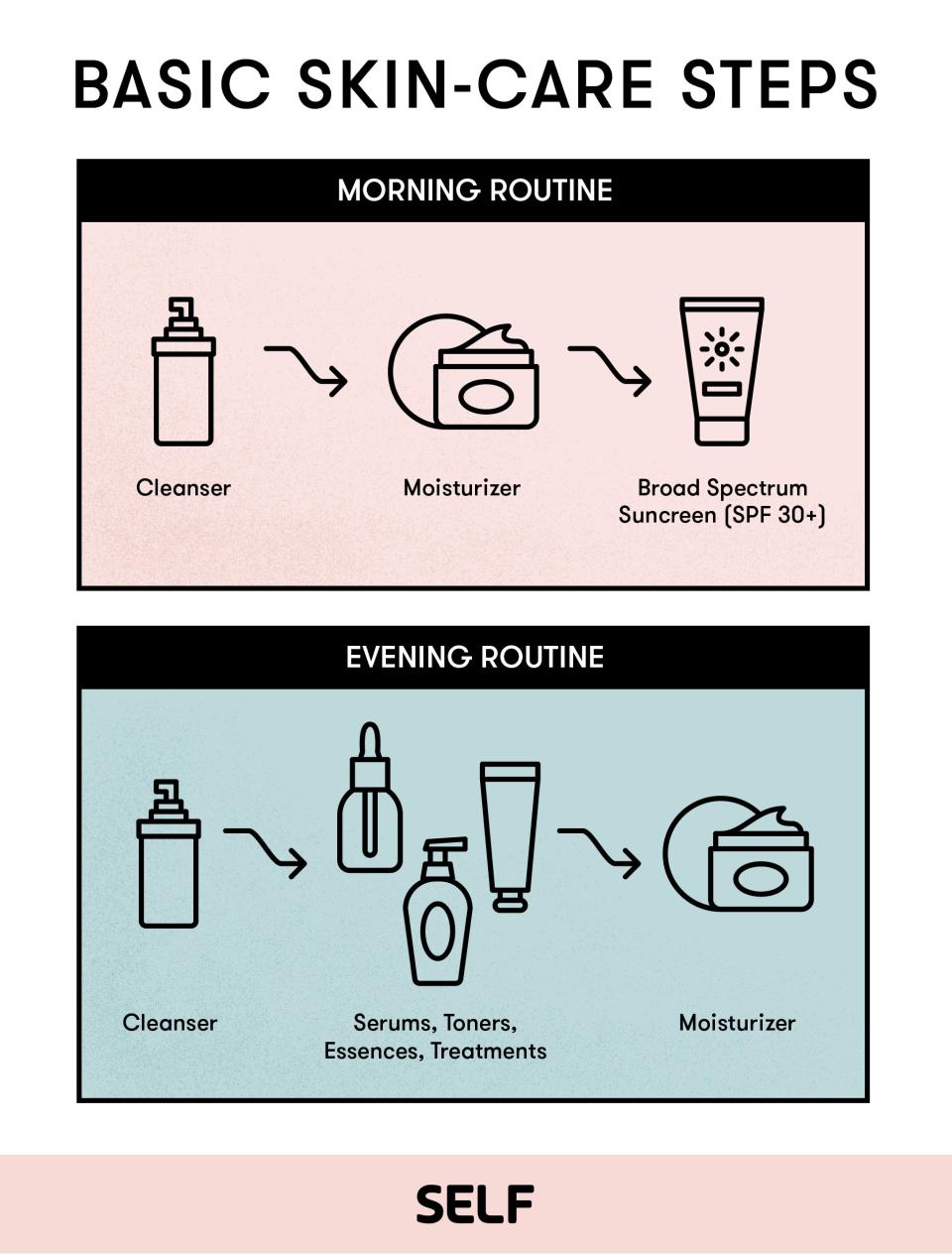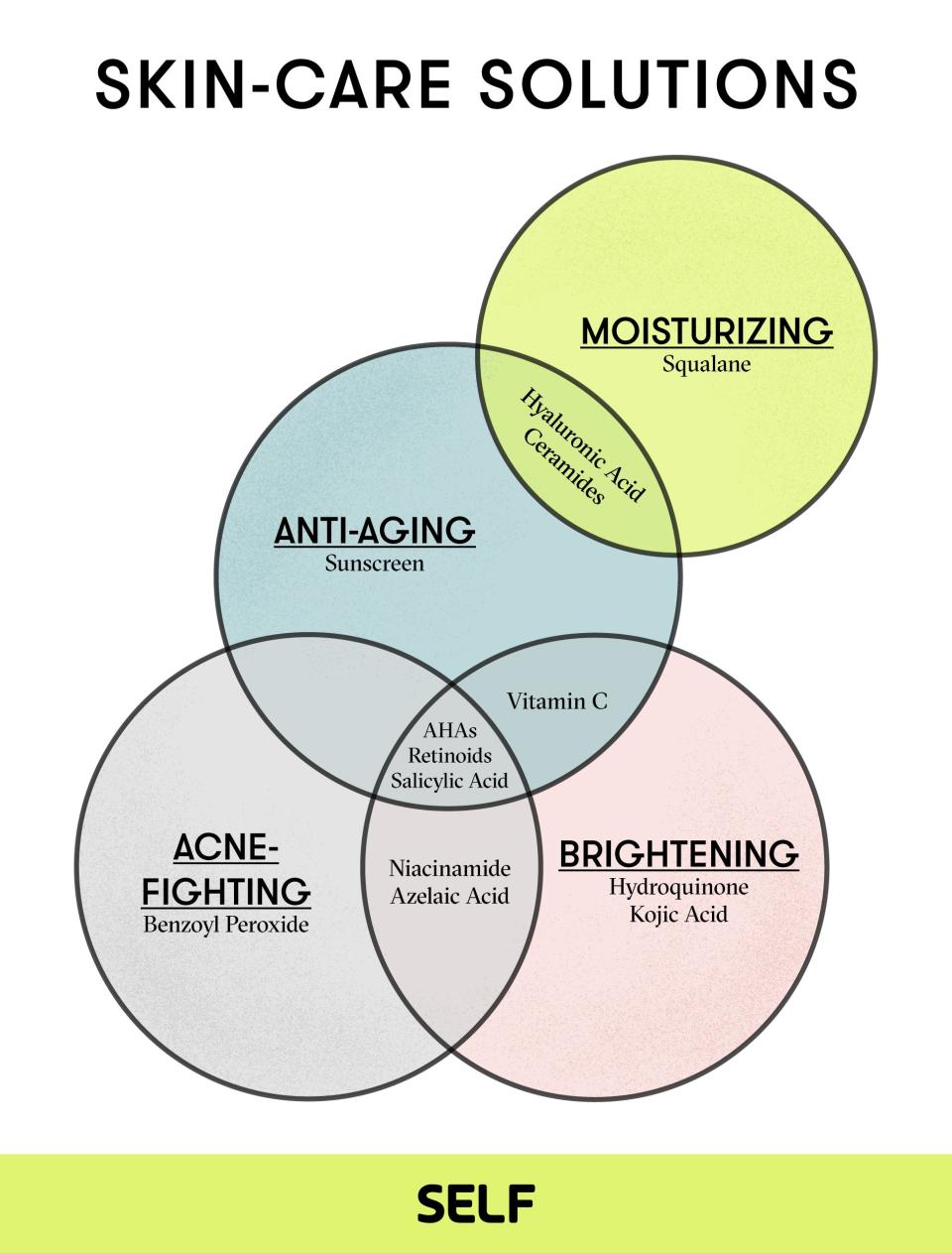SELF’s Comprehensive Beginner’s Guide to Skin Care
Depending on who you ask, having a skin-care routine could mean a million different things. Is it putting on the occasional acne-fighting sheet mask? Lining up all 18 of your expensive serums for the perfect #shelfie? Reading and somehow understanding the textbook of an ingredients list on every product? Or is it carefully applying juuust the right amount of prescription cream to calm down a patch of psoriasis without feeling too greasy?
The truth is, of course, that it can be all of the above—and each skin-care routine is necessarily as unique and individual as the person following it (or attempting to, anyway). But as skin care has become trendier and its definition has become wider in scope, it’s also gotten a little more intimidating and confusing for a beginner to get started.
That’s where we come in. As you begin your skin-care quest, we hope to answer here in this skin-care 101 guide as many of your questions as we can—with the help of research and experts rather than hype.
Here’s how to use this guide: If you’re brand-new to the idea of a skin-care routine, it helps to start at the very beginning, where we answer your most basic questions about skin care—even the ones you may be too embarrassed to ask all your skin-care-savvy friends. If you’ve dabbled in skin care and just really want to know what ingredients might be right for you, we’ve got you. Scroll down to learn more about the actual elements in a skin-care routine and an overview of active ingredients that work best for certain skin conditions. We also have specific sections for skin of color, what to do if you’re pregnant, and what to keep in mind if you have a diagnosed condition that affects your skin. Plus we break down some often confusing aspects about the skin-care industry, such as whether or not the Food and Drug Administration (FDA) regulates skin-care ingredients and what exactly manufacturers mean when they call their products “clean.”
In each section, you’ll find links to all our coverage on that topic, so make sure you click on anything that piques your interest if you want to learn even more.
And last, don’t forget to check out our glossary of popular skin-care terms, which can help clear up any lingering confusion you have.
Let’s get started!

ASMEBeauty_DividersFINAL
What do you really mean when you say “skin care”?
We mean the basic care and keeping of your largest organ—your skin! It plays an important role in protecting you from outside pathogens and, you know, holds all your internal organs in place. And in the same way that you regularly brush your teeth, your skin requires at least some attention to keep it functioning properly.
It also requires protection—from skin cancer, primarily. At SELF, when we talk about skin care we’re talking about science-backed ways to improve both the look and function of your skin to address and manage both cosmetic and medical concerns.
This guide is for anyone who is curious about what it means or what it takes to have a skin-care routine but doesn’t know where to start.

2019BeautyAwards-beauty-winners_also.jpg
Photo: Felicity Ingram; Wardrobe: Ronald Burton; Hair: Jerome Cultrera at L’Atelier; Makeup: Porsche Cooper; Manicure: Yukie Miyakawa at Walter SchupferWhy should I care about skin care?
Yes, caring about skin care might be quite trendy these days, but no matter what, giving your skin some love has both cosmetic and medical benefits. For instance, although you can’t slow down the passage of time, with a finely tuned skin-care regimen you can reduce the appearance of fine lines, wrinkles, dark spots, and sun damage. You can also quite effectively manage some more minor skin concerns, such as dryness or oiliness.
For those with specific skin conditions such as psoriasis, eczema, rosacea, and acne, skin care isn’t always optional and requires a bit more thought. For one, treating a specific skin condition often means you need to employ a particular skin-care regimen, and for another, your condition may make your skin more sensitive to ingredients and products in general. Finding a skin-care routine that works can offer a vital way for someone to manage and treat their condition.
There’s also the fact that many people find their skin-care routines to have some mental health benefits—having that routine may help you realize just how easy it can be to do nice things for your body and build healthy habits. Two great examples of this are “Why I Embraced Skin Care After My Mother’s Death” and “How Skin Care Became a Crucial Part of My Sobriety Toolbox”, personal essays we’ve published in recent years.
We also know that practicing skin care can provide benefits not entirely related to your skin. Many people find that sticking to a skin-care regimen gives them a routine and sense of control. Others find that going through their routine or even applying the occasional mask relaxes them and helps them focus their attention on themselves maybe for the only time in their day.
That said, some skin-care companies make a lot of big claims about what their products can do without necessarily having the evidence to back them up. At SELF, our aim is to help you make the most informed decision before buying or trying a product and to guide you toward the treatment options we know the most about.

ASMEBeauty_DividersFINAL
I’m ready to start a skin-care routine. What do I need to know before I begin?
Before figuring out what to include in your skin-care routine, it’s important to know your skin type and if you have any major concerns you want to address. It’s also good to remember that everyone’s regimen is individual—what works for your friends or family or randos online may not be best for you.
To figure out your skin type, think about how your skin acts without any makeup or products on it a few hours after taking a shower. If it gets a little greasy or shiny, you probably have oily skin. If it feels dry or flaky, you have dry skin. If you have dry skin in some places and oily skin in others (usually on the T-zone), you have combination skin. If you have none of those things, you’re considered to have “normal” skin. Knowing your skin type will help steer you toward products that will manage dryness and oiliness while effectively taking care of any other skin concerns you have.
If your skin tends to get irritated when you use certain products, if you’ve ever had an allergic reaction to a product, or if you have certain skin conditions on your face (eczema, psoriasis, rosacea, et cetera) you may have sensitive skin. People with sensitive skin can have oily, dry, combination, or normal skin too, but may need to take extra care in selecting products that don’t cause irritation or exacerbate skin conditions.
You don’t necessarily need to see a dermatologist before starting a skin-care routine. But if you have sensitive skin (or aren’t sure if your skin qualifies as sensitive), if you have a skin condition, or if you’re trying to address any major concerns (such as stubborn or severe acne or hyperpigmentation), it’s important to check in with a board-certified dermatologist who can guide you through the process.
Here are some great articles that can help you before you begin a skin-care routine:
How to Know If You Should See an Esthetician or a Dermatologist
How Bad Is It to Switch Up Your Skin-Care Products All the Time?
Sorry, Makeup Remover Wipes Aren’t as Good as Washing Your Face
Ask a Beauty Editor: Why Is My Skin Always Oily Halfway Through the Day No Matter What?

2019BeautyAwards-beauty-winners.jpg
Photo: Felicity Ingram; Wardrobe: Ronald Burton; Hair: Jerome Cultrera at L’Atelier; Makeup: Porsche Cooper; Manicure: Yukie Miyakawa at Walter SchupferOkay, got it. So what are the basic steps of a skin-care routine?
Skin care doesn’t have to be complicated if you don’t want it to be. The three basic steps of a skin-care routine are cleansing, moisturizing, and applying sunscreen (at least SPF 30 and broad spectrum). You should cleanse then moisturize every morning and night. You should also apply sunscreen every morning, but you can use a moisturizer that has at least 30 SPF and broad-spectrum protection to combine those two steps. You can use a daytime moisturizer with SPF at night too, although you may find that a thicker product is more moisturizing and better suited to nighttime use because you don’t need to worry about being able to put makeup over it—plus, you don’t need to worry about SPF while you’re sleeping.
If you wear heavy makeup or sunscreen during the day, you may find that your cleanser doesn’t get all your makeup off or still leaves you feeling kind of greasy. In that case, you might benefit from double cleansing, a process in which you wash first with an oil-based cleanser followed by a water-based cleanser or micellar water on a cotton pad to remove anything left behind. But double cleansing is not a requirement.
Serums, toners, exfoliants, and prescription treatments should be applied after cleansing but before moisturizing.
Read more about the basic steps of a skin-care routine:
Your Skin-Care Routine Actually Only Needs These Three Things
Here’s Exactly How and When to Use 5 Basic Skin-Care Staples
How to Find a Moisturizer That Won’t Leave Your Face a Greasy Mess
How Much Does the Order You Apply Your Skin-Care Products Actually Matter?

ASMEBeauty_DividersFINAL
Morgan JohnsonSounds doable. But I also want to address a specific skin issue. How do I do that?
This is where products that contain specific active ingredients—known as just “actives” by skin-care enthusiasts—come in. Active ingredients are chemicals or compounds in a product that are actually treating your skin for the concern the product is supposed to treat it for. For example, if you buy a product to help treat your acne, the active ingredient is the ingredient doing most of the work to clear up your acne.
Some actives may be broken out on a product label in a drug-facts box because they’re regulated more tightly by the (FDA). But in general the FDA doesn’t test cosmetic skin-care products for safety or efficacy, so we don’t really know how well they work most of the time. That’s why there’s always some trial and error inherent in figuring out a skin-care routine for your specific skin.
The use of most actives is based on some research though, so we have at least a theory about what they can do and how well they do it.
Read more about active ingredients:
Here’s How to Build Your Tolerance to Irritating Skin-Care Products
How to Care for Your Angry Skin After an Allergic Reaction on Your Face

2019 Healthy Beauty Awards Skin Care Guide 3 crop
Photo: Felicity Ingram; Wardrobe: Ronald Burton; Hair: Jerome Cultrera at L’Atelier; Makeup: Porsche Cooper; Manicure: Yukie Miyakawa at Walter Schupfer. On model: Bodysuit by Alix. Earrings by Lady Grey.Great. So how do I know which active ingredients are right for my skin?
Picking the right active ingredients depends on the specific skin concerns you’re hoping to address. Here are a few of the most common issues:

ASMEBeauty_DividersFINAL
Signs of aging
Some common signs of aging include photodamage dark spots, fine lines, wrinkles, and sagging skin.
Ingredients
Retinoids: These compounds—retinol, retinal (or retinaldehyde), retinoic acid, and synthetic retinoids like Adapalene and Tazerac—are one of only two proven ways to prevent the signs of aging. (The other is sunscreen!) Retinoids, which are forms of vitamin A, work by stimulating the skin-cell-shedding process from below, leading to smoother skin and a reduction in both signs of aging and acne. These come in both prescription and over-the-counter products, so if you aren’t satisfied with the results of an over-the-counter option, check with a dermatologist about getting a prescription version. Retinoids are also notorious for causing irritation when you first start using them, so it’s crucial to apply them just a few days a week to start with and to apply a moisturizer right after using them.
Sunscreen: You’ve likely used a sunscreen before to prevent sunburns, which are one form of U.V. damage. But did you know that U.V. rays can also contribute to other kinds of damage? And that damage can cause dark spots, wrinkles, and other signs of aging? It’s true. Preventing that—and skin cancer, of course—is a major reason to use sunscreen every single day. Be sure to use a sunscreen that’s at least SPF 30 and provides broad-spectrum protection, meaning it protects against both UVA and UVB rays. Although the sunscreen in your makeup doesn’t count as your daily SPF, the sunscreen in your moisturizer can—as long as you use it on your ears and neck as well as your face.
Niacinamide: This is a form of vitamin B3 (niacin) that can be applied to the skin. There is some research to suggest that it can be helpful for managing acne, rosacea, and signs of aging including hyperpigmentation, fine lines, and wrinkles.
Ceramides: Ceramides are intercellular lipids, meaning they fill in the spaces between your skin cells in the stratum corneum (the outer protective layer of skin). Your skin already makes ceramides on its own—without them, your skin won’t be able to effectively hold moisture in or keep irritants out. Topical ceramides may be present in both prescription treatments for eczema and over-the-counter products.
Vitamin C: Yes, that vitamin C! This vitamin is essential for producing collagen and other important compounds in the body. And when it’s applied topically it can function as an antioxidant, thus preventing U.V.-related damage. It can also inhibit the production of melanin (pigment) in the skin, making it a good option for lightening dark spots due to photoaging or other kinds of damage. But beware that all forms of vitamin C are not created equal—some are more or less effective or stable than others. Vitamin C often appears on the label as these derivatives—look for ingredients such as magnesium ascorbyl phosphate, ascorbyl 6-palmitate, ascorbic acid sulfate, or L-ascorbic acid (also referred to simply as ascorbic acid).
Peptides: Peptides are known as the building blocks of proteins. They’re made up of short chains of amino acids. In the realm of skin-care, we mostly talk about peptides as building up collagen, a protein your skin needs to keep its structure. Different types of peptides might do the job of bolstering your collagen in different ways, but the most common ones are signaling peptides, which can both stimulate the skin’s collagen production and slow down the natural breakdown of collagen.
More on ingredients for aging:
Here’s What You Need to Know Before Buying Drugstore Retinol Products
Why Just About Everyone Should Think About Using a Ceramide Cream
Ask a Beauty Editor: What Do I Need to Look for in a Vitamin C Serum?

ASMEBeauty_DividersFINAL
Acne
Although it’s very common, acne is a lot more complicated than most of us realize. For instance, there are different types of pimples (whiteheads, blackheads, et cetera), which may be inflamed (red, swollen, painful) or not. Acne can also be influenced by many factors in your life, such as your hormones. So if your acne is severe or if your over-the-counter treatment options aren’t helping, it’s important to see a dermatologist who may be able to prescribe you something more effective.
A note on fungal acne: Fungal acne is a colloquial term for a type of yeast infection that inflames the hair follicles on your skin. The actual name for this condition is either pityrosporum folliculitis or malassezia folliculitis, depending on whom you’re talking to. It causes red bumps and pustules that might look like acne, but don’t usually affect the face. Unlike actual acne, so-called fungal acne is treated with antifungal medications. So if you’re not sure what type of bumps you’re dealing with or your usual acne treatments don’t seem to be helping, talk to a dermatologist to see if you might be dealing with a fungal issue instead.
Ingredients
Retinoids (see above)
Chemical exfoliants: You may already be familiar with physical exfoliants such as scrubs and brushes. And while those are perfectly effective at removing dead skin that can clog pores, they’re not exactly gentle. That’s why many dermatologists recommend their patients stick with chemical exfoliants, which include both alpha hydroxy acids, or AHAs (such as lactic acid and glycolic acid), and beta hydroxy acids, or BHAs (essentially just salicylic acid). Rather than physically scrubbing the dead skin cells off your face, these break down the bonds between those cells so that you can easily wipe them away. They’re present in all kinds of products, including cleansers, toners, masks, and serums.
Benzoyl peroxide: Unlike salicylic acid, benzoyl peroxide can kill the type of bacteria that’s often responsible for inflamed acne. That’s why it’s often recommended to use both benzoyl peroxide and salicylic acid to help manage mild to moderate acne. For more severe acne, a retinoid or other prescription treatment may be necessary. Both salicylic acid and benzoyl peroxide can also irritate or dry out skin, so it’s important to also use a moisturizer when you’re using these ingredients.
Niacinamide (see above)
Azelaic acid: A type of acid synthesized by yeast, barley, and wheat that’s believed to have a gentle exfoliating effect. Research has shown that it’s effective at managing both acne and acne-like bumps that are a common symptom of rosacea. It comes in prescription and over-the-counter forms.
More on how to treat acne:
Why So Many People Swear By Azelaic Acid to Combat Acne and Redness
How to Get Rid of Blackheads on Your Nose, Chin, and Forehead
Here’s How to Tell If Your Skin-Care Products Are Actually Noncomedogenic

ASMEBeauty_DividersFINAL
Scars and discoloration/hyperpigmentation
For some people, scars are almost a badge of honor or a physical mark that shows you endured an intense event. But others would rather not have them hanging around. And if you’re trying to minimize the appearance of a scar, the first thing to know is that you’ll have to be patient—and especially skeptical.
Over-the-counter topical scar treatments don’t have a ton of evidence behind them, unfortunately. What does work? Moisturizing—almost to an excessive degree—and time. If that doesn’t help, you should chat with a dermatologist about your other options, which may include prescription topical treatments or laser treatments.
When it comes to dark spots, melasma, or other hyperpigmentation concerns, though, you can try brightening ingredients, like vitamin C and hydroquinone.
Ingredients:
Vitamin C (see above)
Chemical exfoliants (see above)
Retinoids (see above)
Sunscreen: Prevents dark spots from getting darker (see more above). Emerging research suggests that visible light, including light that comes from our devices like phones and laptops, may be a factor in exacerbating hyperpigmentation, especially melasma. Some experts recommend that people trying to manage those issues look for sunscreens containing iron oxides, which block visible light, in addition to other SPF ingredients. You’ll have to check the ingredients to find out if your sunscreen has them, but know that sunscreens with a tint usually have iron oxides.
Hydroquinone: Considered the gold standard of brightening ingredients, hydroquinone is available over-the-counter at (concentrations of up to 2%) and via prescription in higher strengths.
Read more about treating skin with scars and discoloration:
8 Dark Spot Treatments That Really Work, According to Dermatologists
Ask a Beauty Editor: How Long Does It Take for Topical Scar Creams to Actually Work?

ASMEBeauty_DividersFINAL
Dry and sensitive skin
Dry skin also tends to be sensitive, and dry skin can also be a symptom of skin conditions that make the skin more sensitive, like eczema. So products for dry skin are often suitable for sensitive skin as well—but not always.
If you have sensitive skin (meaning you are prone to irritation or allergic reactions or have a skin condition like eczema, psoriasis, or rosacea), it’s especially important to be aware that products containing things like parabens and fragrances are more likely to cause a reaction. It’s also a good idea to patch test any new product on your inner arm before using it all over your face.
Ingredients:
Hyaluronic acid: Hyaluronic acid is found naturally in the skin and acts as a humectant, meaning it can draw moisture into the skin; products with these molecules allow moisture to bind to the skin without feeling greasy or heavy.
Squalane oil: Squalane is a light moisturizing oil that mimics a component of sebum, the oily substance our skin produces. There is limited research on the effect of topical squalane on skin, but in general it acts like an emollient when applied, which means that it can squeeze into the spaces between skin cells and make your face feel smoother and more moisturized without being too heavy or occlusive.
Colloidal Oatmeal: Colloidal oatmeal is made from grinding oats and mixing them with water or other liquid, which creates a mixture that can provide a soothing, protective barrier on the skin. Experts recommend it specifically for dry and sensitive skin, including skin that’s actively irritated, in which the skin’s natural barrier may need some extra help.
Bakuchiol: Bakuchiol is a plant extract that some early research suggests can have a beneficial effect on skin, particularly with regard to managing signs of aging, without irritation. It’s often called a “natural retinol alternative,” although it doesn’t have the same amount of conclusive evidence behind it. But experts say bakuchiol may be a good option—especially if your skin is too sensitive for retinoids.
Niacinamide: (see above)
Ceramides: (see above)
Read more on treating sensitive skin:
7 Derm-Approved Tips to Make Life With Sensitive Skin a Little Bit Easier
9 Hyaluronic Acid Products Dermatologists Always Recommend for Hydrated Skin
What the Heck Is Squalane Oil and Why Is It in All My Skin-Care Products Now?
Centella Asiatica: What It Can Really Do for People With Sensitive Skin
Ask a Beauty Editor: Can I Use Redness-Relieving Products Even If I Don’t Have Rosacea?
10 Gentle Exfoliators Dermatologists Recommend for Sensitive Skin
Meet PHAs, the Chemical Exfoliants Your Sensitive Skin Might Just Love

There are so many kinds of skin-care products on the market, it’s hard to know what works and what’s hype. What else should I know about skin-care ingredients before I get started?
As we mentioned above, cosmetic skin-care ingredients don’t go through FDA testing before they hit the market, so we don’t have data on how effective or safe each over-the-counter product is. Many companies make claims about their products based on the ingredients that are in the product, which may or may not be similar to the ingredients used in scientific research.
Basically, unless you’re using a prescription treatment, it’s tough to know what you’re actually getting when, so it always pays to weigh the potential risks and benefits before putting something new on your skin. So your best bet is to spend money on products containing active ingredients with the most promising research behind them.
In general the risks include irritation, allergic reactions, or simply wasting time and money. But if you have sensitive skin or a skin condition, you’re more likely to experience those kinds of adverse reactions, so you’ll want to be more careful when trying new products, especially trendy new ingredients that don’t have a lot of solid evidence for their claims. If in doubt, you can always check with a dermatologist.
More about trendy skin-care ingredients and the actual science behind them:
I Washed My Face With Manuka Honey for a Week—Here’s What Happened
Is There Literally Any Reason for CBD to Be in Your Skin-Care Products?
Caffeine Doesn’t Really ‘Wake Up’ Your Skin—But It Might Do Something Else
Here’s What Dry Brushing Your Skin Actually Does—And Doesn’t Do

Is there anything in particular I need to know about caring for my skin of color?
People of color are generally more susceptible to skin issues involving hyperpigmentation, such as melasma and post-acne dark spots. You may also be more likely to develop scarring or hyperpigmentation after inflammatory skin issues, like acne, psoriasis, or eczema.
That can be frustrating because treating pigmentation concerns in darker skin is often somewhat challenging with treatments that are commonly used on white skin, like laser treatments. But laser treatment techniques have advanced a lot in recent years, and in the hands of an experienced practitioner they can be safely used in patients with skin of color. Additionally, topical treatments containing things like hydroquinone and vitamin C can help too. But whatever you do, know that treating hyperpigmentation takes time—possibly six months to a year.
There’s also a prevalent myth that people with darker skin don’t need to wear sunscreen—this is definitely not true! The sun can still cause damage even if you’re not getting sunburned. And that damage can both lead to skin cancer and exacerbate hyperpigmentation. If you have any questions about how to care for your skin of color or about managing an issue like melasma, your best bet is to talk to a dermatologist.
More on caring for skin of color:
5 Things People of Color Should Know About Taking Care of Their Skin
Why Are Black People Less Likely to Get Melanoma but More Likely to Die From It?
I Desperately Tried to Find a ‘Cure’ for My Undereye Circles—Until I Realized They’re Genetic
What You Should Know About Melasma, Those Random Dark Spots on Your Face

ASMEBeauty_DividersFINAL
I’m pregnant. What products can I use and what should I avoid?
When you’re pregnant or breastfeeding, you may need to temporarily stop using certain products, especially certain acne products. According to the American Academy of Dermatology (AAD), pregnant people should definitely avoid using retinoids including isotretinoin, tretinoin, tazarotene, spironolactone, and adapalene. You should also be careful about certain antibiotics, such as doxycycline. Depending on your doctor’s recommendations, you may also need to avoid or limit benzoyl peroxide and salicylic acid. Instead, dermatologists often recommend pregnant people use azelaic acid to manage acne.
You should also be cautious about brightening ingredients, particularly hydroquinone. This is another ingredient you should stop using while you’re pregnant.
In general, though, we don’t have a ton of information about how these (and, honestly, most) medications affect pregnant people, the AAD says. Many of these recommendations are based on an absence of conclusive evidence that they are safe rather than having evidence that they’re definitely harmful.
Above all it’s important to check in with your doctor or dermatologist before using something on your skin when pregnant or breastfeeding because they can assess your individual skin situation and help you figure out what makes sense for you.
More on caring for your skin while you’re pregnant:
How to Know What Beauty Products Are Safe to Use When You’re Pregnant
5 Acne Products That Are Safe to Use While Pregnant or Trying to Conceive
17 Skin-Care and Beauty Products People Loved When They Were Pregnant

ASMEBeauty_DividersFINAL
What if I have a specific medical condition that affects my skin?
If you have a skin condition (such as rosacea, psoriasis, eczema, or severe acne) or any condition that affects your skin, it’s important for you to see a dermatologist and make your skin-care decisions with their input. Not only is your skin likely to be more sensitive to skin-care products, you also don’t want to do anything that might exacerbate the underlying condition.
Plus if you’re trying to manage that condition, you can only go so far with over-the-counter products. Sometimes they can get the job done (like using a drugstore cleanser containing salicylic acid for mild acne), but you want to be sure that you’re not overlooking another option that may be more effective, like a prescription retinoid.
So over-the-counter products aren’t off-limits for you entirely, but you will want to approach them with caution. It may be wise for you to do patch tests (putting a small amount of a new product on your inner arm for a day or two) before using anything new, or your dermatologist can perform a formal test in their office to see which ingredients you’re likely to be sensitive to. With the right approach, skin care can be an effective (and maybe even fun!) way to manage the symptoms of your condition.
More on caring for your skin if you have a medical condition:
What Can Centella Asiatica Really Do for Red, Dry, Sensitive Skin?
Eczema Treatment: What You Can Do to Stop the Incessant Itch
I Have Keratosis Pilaris. These 8 Products Actually Smoothed My Skin

2019 Healthy Beauty Awards Skin Care Guide 2
Photo: Felicity Ingram; Wardrobe: Ronald Burton; Hair: Jerome Cultrera at L’Atelier; Makeup: Porsche Cooper; Manicure: Yukie Miyakawa at Walter SchupferWhat about “clean” beauty? How do I make sure everything in my skin-care routine is safe?
Considering how little the FDA is involved in regulating cosmetic skin-care ingredients, it’s understandable that you’d want to do whatever you can to make sure you’re only putting the safest ingredients possible on your skin.
But today words like clean and natural are more buzzwords than anything else. These terms don’t have agreed-upon definitions and aren’t regulated by the FDA, so any company can define clean beauty however it wants and give itself that label.
It’s also important to remember that just because something is natural doesn’t mean it’s safe. In fact, natural herbal and botanical ingredients are frequently irritants and allergens for those with sensitive skin. And our health concerns about certain chemicals in makeup and skin-care products are often overblown.
Moreover, herbal and botanical ingredients (which are still chemicals, BTW) aren’t necessarily analogous to the compounds tested in clinical trials. For instance, rosehip contains vitamin A but isn’t the same thing as retinol or retinoic acid, so you don’t necessarily know how much vitamin A you’re putting on your face or what kinds of effects you can expect.
Again, we recommend opting for products that contain ingredients we know the most about. And if you’re not sure if something is right for your skin, talk to a dermatologist.
More on what clean and natural beauty really mean:
What the Research Says About 10 Controversial Cosmetics Ingredients
A Beginner’s Guide to Vegan and Cruelty-Free Beauty and Skin Care

ASMEBeauty_DividersFINAL
I’m really excited to get started. Which products do you like best?
Well, first off we’d suggest checking out the 2020 SELF Healthy Beauty Awards winners. These products were selected from a crop of more than 1,200 new products with the help of dermatologists and reviews from more than 70 testers, including people with skin conditions such as rosacea and psoriasis.
Definitely also take a look at these stories on finding the mainstays of your skin-care regimen: cleanser, moisturizer, and sunscreen.
If you’re interested in looking for products containing specific active ingredients or products that can help address certain skin concerns, check out these handy articles:
7 Over-the-Counter Retinol Serums and Creams Dermatologists Highly Recommend
The 7 Best Eye Creams on Amazon, According to Customer Reviews
The Best Facial Sunscreens on Amazon, According to Customer Reviews
We hope that this guide has helped you demystify the world of skin care. Be sure to check all our skin-care coverage here. Have a burning question about skin care? Email me at askabeautyeditor@self.com, and I may answer your question in an upcoming column!
Originally Appeared on SELF

